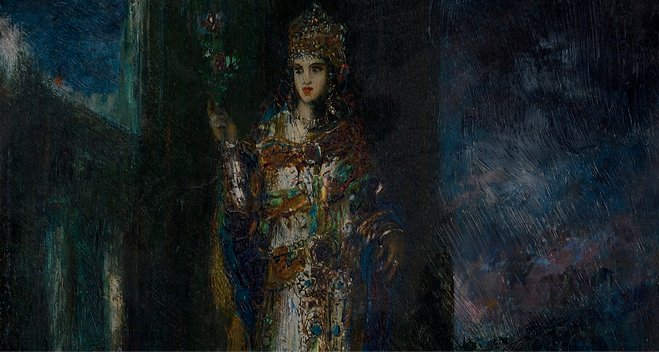An Autumn Rose
- Naida | Orphic Inscendence

- Sep 9, 2021
- 3 min read
Updated: Apr 24, 2024

"I am like the autumn roses, I have never experienced spring, I knew not how to love for years, and now I am late for joy", says an old Turkish song (X)
Walking through the streets today, I saw them - the big, plump roses, with their rainbow of colours, and scents. Some of them, blossom throughout the autumn, deep into October, and sometimes, even early November - until the very first frost of the morning. Such rose, insists to blossom, to open itself to the sun's ray until the cold is stronger than the sun, and it eventually has to die. Whenever I see the autumn roses, I am reminded of the song mentioned above.
The rose of the song, appears to have missed May and June - the time when her sisters open to meet the first longer and warmer days. The autumn rose opens and sees, that she has come late for love and for joy - she arrived at the very last moment, when the sun is already dying. The late-bloomer rose did not get to see the sun's longest and most potent days, and she has to pray to know of sun at all, before the death takes over her. Rose is often a symbol of love, but also pride. In Sufi poetry, especially, she is proud and cruel, she is the Beloved - she is aware of her beauty, aware that she is the Queen of flowers, and that no other flower is as desired as her, that no other flower is as often used as a symbol of royalty, love, devotion, and many others, as her. She is proud, and does not care for the tender nightingale who keeps singing the songs of devotion - for she has countless nightingales who come to her night after night, what difference one or the other would make? Her beautiful flower is surrounded by thorns - and she uses them against the bird's tenderness. The beautiful, the proud, the vain rose.
Then, the beautiful, proud, and vain rose - in order to learn beyond herself, is given a life of autumn. It was said to her: "You shall bloom in autumn, and you shall not know sun's most potent rays. You shall be glad to feel it on a day shorter than others, and your whole life will be awareness of the days getting shorter and shorter, colder and colder, until you die."
The rose is born in autumn to become aware of her greatest desire - to be loved and to be an object of devotion; that which she takes for granted and mocks when she is born in spring. But when she, herself, longs for love, when she is the nightingale she was cruel to - she begins to learn that the nightingale was no one else but her - her own inner desire speaking to her. But she did not want to listen; she thought herself above the sentiments of mere mortals. Perhaps it is in her autumn life that she, humiliated and humbled, becomes aware of herself. That is when she becomes like Shakespeare's Venus: "She’s Love, she loves, and yet she is not loved."
The rose has wrath in her thorns, and beauty in her petals - and she knows that the Divine is just like her. She remembers that the wrath of Divine is also the part of the same One that carries the scented petals. Just before she dies, at the first frost, she remembers the Truth of Herself, which is the Truth of everything, and patiently awaits her spring birth. This time, she says, she will not forget, she will not be cruel to the nightingale, for if she is cruel to him, she is cruel to herself, and if she punishes him, it is she who is also punished.
She goes to sleep with prayer of not forgetting, knowing, that she, again, will be granted the spring birth, and that this time, she will not let it go in vain.
Going to sleep, the rose says: "Oh truly, forgetfulness is at the root of every suffering and every pain. And Remembrance is remedy to every wound. I promise, I hope, I pray, I desire, that I am never of the ones who forget. I promise, I hope, I pray, I desire, that I never forget."
Her petals fall on the ground, but she lets them fall, without fear - the sun, despite her cruelty and lack of gratitude, will give her petals again, and those petals will invite the nightingale to her, again, and because of her autumn birth, she will allow the nightingale to drink the dew from her petals, and she, will allow herself to bathe in his song.





It's steeper near the roses
Thanks
Hubert
Flowers Belgium
how far is too far?
how high? how deep?
late autumn roses
This was beautiful!